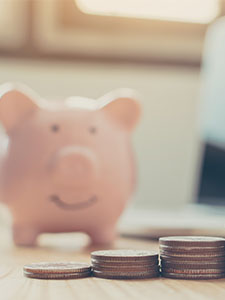POST TAGS
Blog posted On December 02, 2020

You’ve refinanced your mortgage, paid off your student loans, and you still have some extra savings leftover. Interest rates are still trending extremely low, but you’re fresh out of ideas on how to take advantage of them. Before you go buying another online streaming service, consider putting your money toward one (or more) of these three high-return investments that can help you maximize your savings, even when interest rates are low.
Create an Emergency Fund in a High-Yield Savings Account
If the coronavirus pandemic has taught us anything, it’s “be prepared for everything.” Rather than building your emergency fund in a traditional savings account or investing money in a certificate of deposit (CD), consider opening a high-yield savings account. Unlike a CD, a high-yield savings account doesn’t lock you into your rates upon deposit. If you invest in a high-yield savings account while rates are low (now), you have the potential to make more money when rates eventually rise. Plus, you can withdraw from this savings account just like you would with a traditional savings account. If you withdraw from a CD before your term is up, you will have to pay an early withdrawal fee and the length of CDs can vary anywhere from three months to five years.
“You will not get enough compensation for locking up your money in a CD,” says Dabney Baum, a financial advisor with Baum Wealth Advisors at Janney Montgomery Scott. Even with a traditional savings account, you make significantly less money than you would with a high-yield account. Interest rates offered on high-yield savings accounts can be up to 25 times higher than rates offered on traditional savings accounts.
The only trade-off is that you may need to hold your high-yield account at a different bank than your checking account. However, electronic transfers are often easy to set up. There is very little risk in establishing an emergency fund in a high-yield savings account. Unlike most stocks and bonds, high-yield savings accounts are secure and insured by the Federal Deposit Insurance Corporation (FDIC).
Pay Off High-Interest Debt
If you have already established a decent emergency fund, paying off your debt would be good for your financial health. It’s a “guaranteed return.” For example, if you pay off a credit card that’s charging you 20% interest, that’s a 20% return. Cutting down or paying off large amounts of debt is often a smart option – just in case something was to happen to your source of income.
To help optimize your debt payoff strategy, organize and prioritize your debts by the avalanche or snowball method. With the avalanche method, you prioritize your debt with the highest interest rate. With the snowball method, you make higher payments only on your lowest debt balance, while still making the minimum payments on your other debt balances.
Invest in Retirement Savings
If you have extra money and already have a well-established emergency fund, consider investing in the stock market using an IRA or 401(k). The returns on these accounts can be as high as 8%, though your success depends on your investment strategy. A good place to start with retirement investing is target date funds, or lifecycle funds – actively managed mutual funds that are designed around the year that you anticipate retiring.
You may think that retirement is far away, but experts recommend getting started on your retirement investments as soon as you can. The majority of Americans think that you should have at least $1.7 million in your retirement account by age 65. This means that you would have to start saving roughly $490 per month at age 25. If you waited to start saving until age 30 – just five years later – your monthly contribution would need to be roughly 35% higher. The earlier you start saving for retirement, the better prepared you will be for possible market fluctuations in the future.
When you have extra cash on hand, your first priority should be establishing an emergency fund. To maximize returns, open up a fund in a high-yield savings account. If you already have an emergency fund established, try to pay off debt or lower debt payments. Once you have these basics covered, then you can consider investing in your future through a retirement account. Then, when you’re happily retired, you can invest in all of the TV streaming services you want!
Sources: CNBC, Investopedia, Time